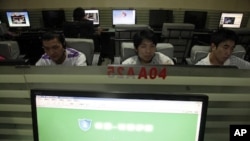Internet users in China are speaking out about a plan to eliminate anonymity on the country’s popular microblogs, saying that the move will limit their freedoms online.
The plan, roughly outlined by senior propaganda officials in Beijing Wednesday, mandates that Chinese-based microblog operators obtain certified real names from their users upon registering new accounts. In a second phase, existing accounts will also be required to provide real information about their identity.
Wang Chen, minister of the State Council Information Office, justified the government’s policy to counter “false, illegal and obscene information that might harm the healthy development of the Internet in China.”
Wang added that such orderly development is a wish of the Chinese Internet users known as “netizens.”
On Weibo, China’s most popular Twitter-like website, bloggers challenged Wang’s claim.
Internet user Mengfei asked for “convincing proofs” that Chinese netizens actually want a name registration system. “When I heard this, it made me want to curse,” he wrote in a post on Thursday.
A netizen nicknamed Mister Langfeng said that the real name registration system would further limit opportunities for free expression for Chinese Internet users.
China, with an online population of more than 505 million people, is the world’s largest Internet market. The Chinese government blocks Internet access to some U.S.-based social networking sites, such as Twitter and Facebook, but there are many domestic microblogging sites.
Half of Internet users in China regularly use microblogging services and commentators have dubbed 2011 “the year of Weibo,” with a nearly 300 percent increase in usage from the year before.
Major news events are widely debated on these online services, where anonymity often allows netizens to be more frank.
Traditionally sensitive topics like government corruption, food safety scandals and human rights spark lively discussions on the Internet, despite government efforts to scale down the discussions when they strongly challenge the Communist party’s agenda.
Weibo has also proved to be an effective tool in breaking news coverage.
On July 2011, it was a post on Weibo that alerted Chinese mainstream media to a deadly train crash. Microblogs kept the conversation going afterwards, asking the government to explain its late and sloppy rescue management.
The Chinese blogger and journalist who calls himself Michael Anti says that Weibo’s simple design, which only requires a phone connected to the Internet to post messages, is key to its success.
From the isolated Chinese countryside people can send messages that reach people with influence in Beijing. And, they can dialogue with them. He says if you have encountered cases of corruption and you want to petition them, then it is likely that some mainstream media will pick them up through Weibo.
Anti became an outspoken opponent of real-name registration in early 2011, when Facebook deleted his account because he did not register using his real name.
He complained against Facebook’s decision then and continues to oppose online real-name policies in every country. He says, “If we link online accounts to real identification, then it decreases the level of freedom one enjoys when using the Internet."
Last December, Chinese authorities announced initial testing of the real-name policy. Municipal governments of Beijing, Shanghai, Shenzhen and Guangzhou ordered microblog operators to register users under their real names.
But there has been high-profile opposition to the plan.
Tencent Holdings Ltd, China’s biggest Internet company, announced earlier this month that it would not implement the real-name system for its popular instant message program, QQ. The company is based in Shenzhen, one of the four pilot cities.
Jeremy Goldkorn, the founder of the China media monitoring website Danwei.org says although authorities said the new system would start in December, not much has changed. “I don’t think it has actually been implemented anywhere, at least not thoroughly. Because it’s still possible to do a lot in the Internet without using your real name, including Weibo services.”
If authorities do follow through on the plan, Goldkorn agrees with other critics who say that the loss of anonymity will have a big impact on microblogs.
“It will certainly have a chilling effect on discussion on Weibo, because a lot of people will be wary of speaking their mind if there is going to be a real name attached to their account. But I don’t think it’s going to kill off Weibo,” Goldhorn said.
The government’s announcement this week comes as it is struggling with finding the best way to manage public discourse.
In his speech, Wang Chen also insisted on the need for better-trained government’s spokespersons who could positively carry out Beijing’s message to domestic and foreign audiences. “The most important thing,” he says, is for the spokespersons to provide “accurate information based on the facts.”




